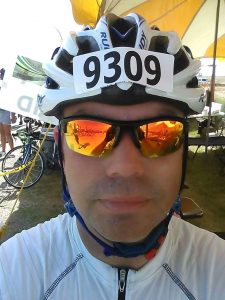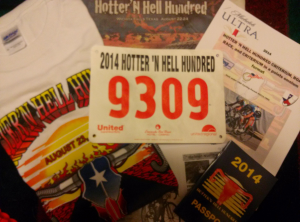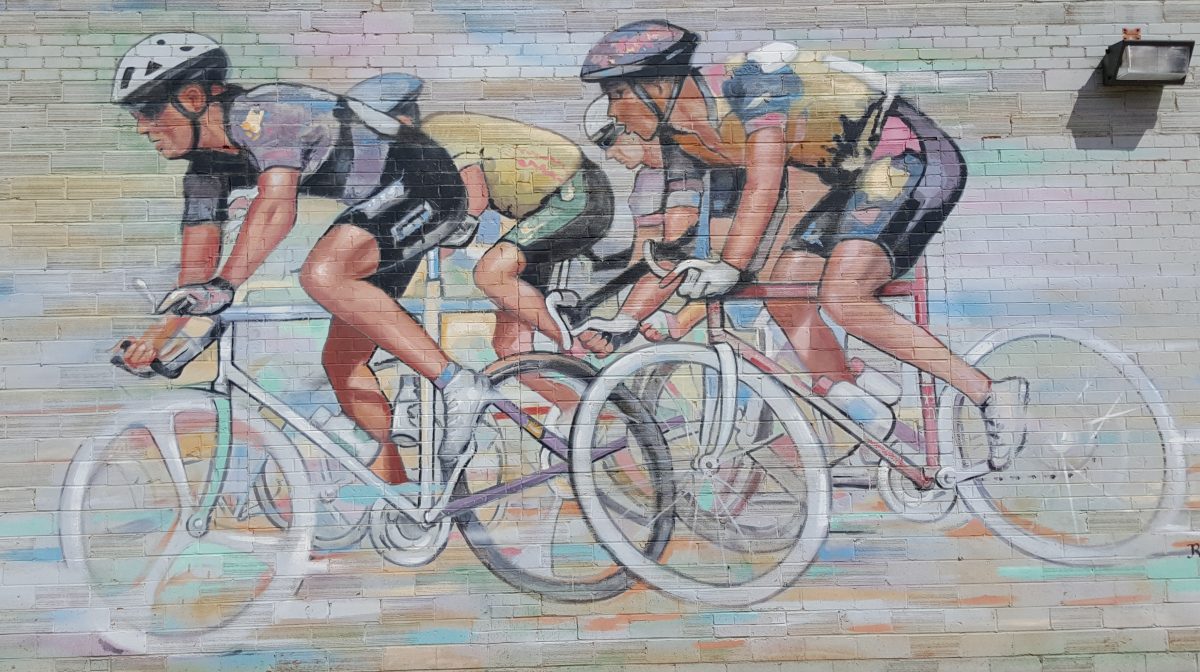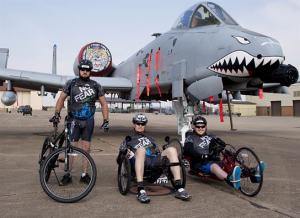So what makes a person want to put their body through the grueling 100 mile ride or compete over three days in the race event? Why do so many continue to come to ride at the hottest time of the year. There are many reasons. Some riders do it to prove something to themselves or to others. To many it is a tradition passed on by members of their family. Others ride to honor a relative. Regardless of reason. For whatever the reason they continue to come and not just from Wichita Falls but from all over the world.

Photo provided by
David Weaver
David Weaver rides for many different reasons. He rides for the challenge of the ride and for the physical benefits. You may remember David for the profile of his daughter Ashley. I sat down with David to get his story as well as his daughters. David didn’t start riding until he was 40 years old. Over the last 6 years his love of the sport has only grown as has his fitness level and riding ability. The ride of 2016 will be his sixth attempt. In each of the previous 5 years David has completed the entire 100 miles. The following is my interview with David.
Ralston: How long have you lived in Wichita Falls?
David: “My whole live”
Ralston: How long you been riding for endurance and not just pleasure?
David: “6 years”
Ralston: How many time have you ridden in the HHH?
David: “This will be my 6th time”
Ralston: So you basically just started right into the HHH?
David: “Yes”
Ralston: So do you think you would be riding like you do without the HHH?
David: “Yes, I probably would.”
Ralston: What’s the furthest distance you have completed? Have you made the hundred miles?
David: “That is the only distance I have ever done. My goal was the hundred miles from the start”
Ralston: How often do you ride now?
David: “At least 3 days a week.”
Ralston: On your training do you train all year round or do you kick it up at a certain time of the year?
David: “When the spring comes I ride more. In the winter I hit the gym and spin classes unless it is 70 degrees and I will ride.”
Ralston: How old were you when you first started to ride?
David: “40”
Ralston: Was it harder starting that late in life?
David: “Yes, you have no idea what it is like to ride 25 or 30 miles trying to get into it. The first ride I ever did was by myself I did maybe 7 miles and I was dead.”
Author: I know you seem to be in pretty good shape. Do you credit that to the riding.
David: “Yes, for sure.”
Ralston: In your own words what made you want to start riding the HHH? Was it someone you know?
David: “Well I got my daughter into riding after high school and she was headed to college. I knew she wanted to continue to compete and she didn’t want to run any more. I meet a guy that had been riding in the HHH for years. Can’t seem to recall his name right now. Met him and talk to him about it and thought Ashley might be interested. Approached it with her and set her up a meeting with the MSU coach Julie Carter which is also her coach now at Lindenwood. A few weeks later Ashley said she wanted to start riding. I remembered how much I loved to ride as a kid so I got a bike and gear and started to ride with her. Sort of a father daughter bonding.”
Ralston: What is the difference in the bike you ride? Can I go get one say at Walmart?
David: “No you can’t get one at Walmart. I ride a carbon composite bike, a racer’s bike. Walmart bikes are not meant for the long distance. If I had a Walmart or academy bike, I would wear it out in like a month. My bike and gear cost well over $1500.”
Ralston: You said you ride 3 days a week about how far do you ride each time?
David: “I ride 30 miles on mon and wed and about 60 on Saturday, but nothing compared to what Ashley does. She can knock out 3 to 500 miles a week”
Ralston: I know you said you have done the ride. Have you ever done the race?
David: “No, I do not ride races. They are dangerous and a whole different animal. They push shove, bump and it is very competitive/”
Ralston: Would you be upset if it didn’t get 100 degrees?
David: “NO I would ride faster”
Ralston: I was told some people get upset if it doesn’t
David: “I wouldn’t be upset at all if didn’t hit 100 degrees. It doesn’t get bad till you hit about 70 miles. Someone in my shape feels it for sure, and I am not in bad shape. When you get to Burk and you have done 30 miles, you realize you are on a hundred mile ride and you want to hit hell’s Gate and you know you have 30 miles to go. As far as heat is concerned when it gets hot, the last 30 miles is when you start to feel it and you are 3 or 4 hours into the ride”
Ralston: So how long does it take you to do the ride?
David: “Last year 4 hours 46 min. Years previous 5 and half or 6 hours.”
Ralston: So you are getting better and better
David: “Last year I lost 35 pounds and hit the gym more so I was much stronger”
Ralston: It takes more than just riding to get in shape?
David: “Oh, yeah, it is a balance thing if all you do is ride and you don’t do anything else your body is not balanced. Your lower body will be good but your upper body will suffer and your back will hurt. Hamstrings will not develop as much so you have to do other things to be balanced”
Ralston: What do you think people in the area think of the HHH? Do they like, hate it or just don’t care?
David: “A little bit of all. I think more people like it and understand the benefits. If everyone knew what the HHH did for the city they would think differently. It brings millions to the city in taxes. HHH funds all the scholarships for the students because the state won’t fund a non NCAA team. It benefits rural road and the local roads. HHH has such a pull they can get the city and state to fix unsafe roads. Because of the money that comes in they do it. Mark Beauchamp is a huge fan of HHH and the traffic administrator of Wichita county. He can usually get things done. He is a big reason for the concrete trails around the city and a big help to cyclist.”
Ralston: I know you ride around here have you ridden in other cities is there a difference in the areas?
David: “All the time “
Ralston: Is there a difference in the way drivers treat you? Are people more aware of bike riders here?
David: “I have friends and have heard of the horror stories but I have only had a few uncomfortable times. I try to stick to the country roads.”
Ralston: So to sum up it all I would take it you are a big fan of the HHH and what it has to offer?
David: “Most definitely”

Photo provided by
David Weaver
David is just one story among the tens of thousands of riders that compete in the HHH each year and will continue to ride in the future. While each rider may have a different story or reason to ride they all have one thing in common–the desire to push themselves to new heights and to be part of an event that is very much bigger than life.
One of the most inspirational stories is that of Christopher Freeman. I know Chris from classes we share at MSU. Chris as told me in passing of how he wanted to ride in the HHH after his accident and the VA helped him by purchasing a special hand bike. The following is a article from the Shepard Air Force Base web site featuring Chris.
SHEPPARD AIR FORCE BASE, Texas — Sheppard welcomed more than 12,000 cyclists through the base during the 34th Hotter’N Hell 100 bike race Aug. 29, 2015.
The base has been part of the event since it began in 1981, and this year hundreds of volunteers once again ensured riders had not only a great and safe ride, but a unique Air Force experience as well.
Riders on the 100K, 50-mile and 25-mile courses entered “Airpower Alley” shortly after coming on base through the Clinic Gate. Pilots from the 80th Flying Training Wing waited beside F-15s F-16s, C-130s, T-38s and A-10s to answer questions about the aircraft and take pictures of riders who stopped for a break.
On route to Sheppard’s rest stop – always one of the top rated stops along the route – riders experienced “Airman’s Alley,” where about 250 technical training students lined both sides of the route to cheer on riders as they entered the last six miles of the race.
“It was the best part of the ride,” said Benjamin Benson of Durant, Okla.
The Sheppard leg is an annual highlight for many riders, but for some, like Christopher Freeman of Wichita Falls, it has special significance.
Freeman enlisted in the Marine Corps in 2006 at age 17, and served honorably until 2010, with assignments at Camp Pendleton, Calif., and Camp Lejeune, N.C. In December 2010 – six months after separating from military service 2010 he was involved in a car accident that left him paralyzed from the waist down.
But that hasn’t stopped him from riding in the Hotter n’ Hell 100 – 2015’s ride was his third in a row.
“At the time of my accident, I was only thinking of survival and getting out of that ditch — for mine and my daughter’s sake,” he said. “Later at the hospital I was in a state of denial for around a week when I thought I wouldn’t walk again, but I knew I couldn’t let this define me in a negative light.”
While the idea of long-term assisted living was considered, Freeman was determined to become able to take care of himself. He worked eight and nine hours a day in rehabilitation.
“I pushed myself to my limits, and within 30 days I went from not being able to move in my bed to being completely independent,” he said.
He was transferred to the Spinal Cord Unit at the Dallas Veterans Administration Hospital, for additional rehabilitation, and was discharged back home after just two weeks.
Soon after, he resumed his education, which the accident had interrupted. By 2013 he had earned his Associates Degree from Vernon College and transferred to Midwestern State University.
“In December, I will get my Bachelor of the Arts in History Education, and I am student teaching at Holliday High School,” he said. “I worked on two research projects with the University and one we hope will be published with me as the primary author here soon.”
Freeman received the Outstanding Secondary Education Student of the 2014-2015 school year and also serves as vice president of the Armed Forces Veterans Organization at MSU.
Riding in the Hotter’N Hell using a handcycle is not only great exercise, Freeman said, but also a chance to participate with friends and family – and to inspire others.
“This disability has given me the opportunity to share my story with people from all walks of life,” he said. “It’s allowed me to show others that your life is what you make it — even negative things can always have a silver lining.”
Freeman was recently married and continues to raise the daughter, now 6, who motivated him to crawl out of that ditch.
Chris has participated in the HHH 2 times and completed 25 miles each time, this year Chris is doing 50 miles. Chris’ story if one of courage and commitment. Just one more person touched by the HHH. In this case it gave him a goal to work for, a reason to go on, and a way to satisfy that need to compete.
Jarrod Smith, (left), Clay Jacobs, (middle), and Christopher Freeman, (right), take a break at a rest stop at Sheppard Air Force Base, Texas, during the Hotter’N Hell 100 bike race Aug. 29 2015. Freeman is a veteran who was paralyzed from the waist down after a car accident in 2010. He has participated in three Hotter’N Hell rides since the accident to share his story of resiliency with other riders, and observers along the route. (U.S. Air Force photo by Danny Webb/Released)

